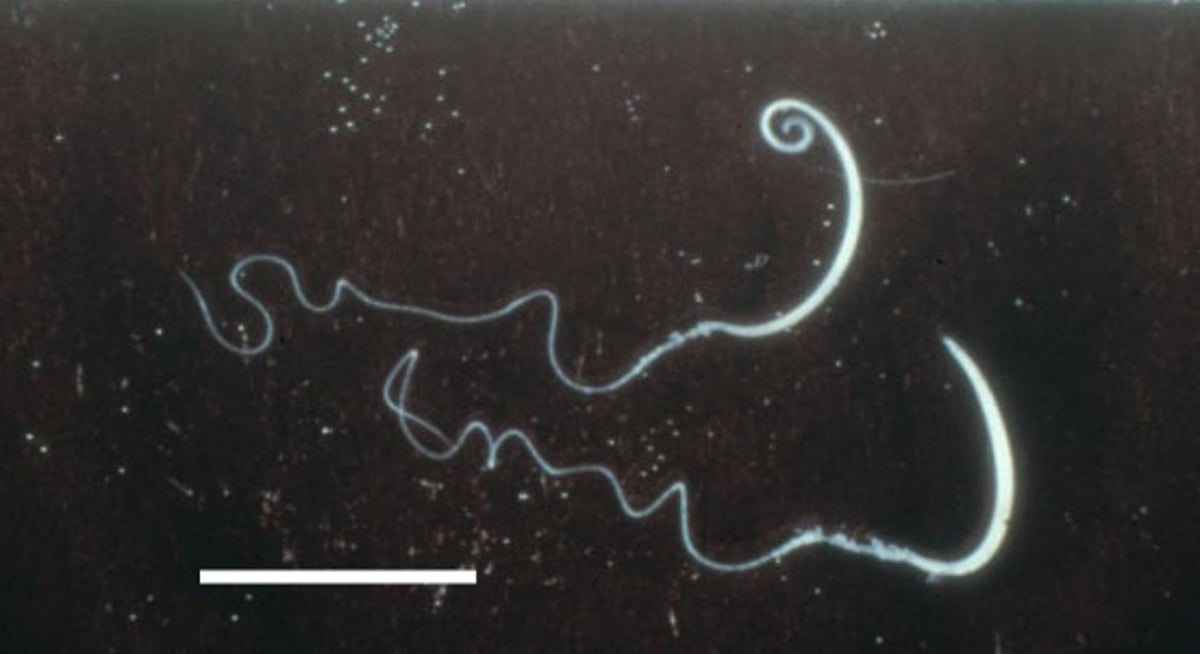Courtesy of Dr. Andrew Peregrine.
Courtesy of Dr. Andrew Peregrine.
Adult Trichuris vulpis are 45–75 mm long and consist of a long, slender ventral portion and a thick dorsal third. They commonly inhabit the cecum and colon of dogs, where they are firmly attached to the wall with their ventral end embedded in the mucosa. Thick-shelled eggs with bipolar plugs are passed in the feces and become infective in 1–2 months in a warm, moist environment. Although eggs may remain viable in a suitable environment for up to 5 years, they are susceptible to desiccation.
The life cycle is direct. After infective eggs are ingested, the larvae hatch and develop in the wall of the distal ileum, cecum, and colon, and the adults mature in ~11 weeks. They may remain for up to 16 months. T vulpis infects dogs around the world and is often one of the most common intestinal parasites of mature dogs.
No clinical signs are found in light infections; however, as the worm burden increases and the inflammatory (and occasionally hemorrhagic) reaction in the cecum and colon becomes more pronounced, weight loss and diarrhea become evident. Fresh blood may be present in the feces of heavily infected dogs, and anemia occasionally follows.
Trichuris felis (syn Trichuris serrata, Trichuris campanula) infections rarely occur in cats in North America. Infections are more common in tropical and subtropical regions, such as the Caribbean and South America and may occasionally be associated with clinical signs similar to those described for dogs.
Diagnosis of Whipworms in Small Animals
Clinical evaluation
Examination of feces for parasite eggs
Examination of feces for whipworm antigen
The characteristic symmetrical, thick-shelled eggs with bipolar plugs are detected on flotation of feces from infected dogs and cats; egg dimensions are 72–90 x 32–40 mcm. Centrifugal fecal flotation methods maximize diagnostic sensitivity.
At least one commercial diagnostic company offers a whipworm fecal antigen test for dogs that detects antigen of T vulpis. The test also detects antigen of T felis in the feces of cats.
The characteristic symmetrical, thick-shelled eggs with bipolar plugs are detected on flotation of feces from infected dogs and cats; egg dimensions are 72–90 x 32–40 mcm. Centrifugal fecal flotation methods maximize diagnostic sensitivity.
At least one commercial diagnostic company offers a whipworm fecal antigen test for dogs that detects antigen of T vulpis. The test also detects antigen of T felis in the feces of cats.
Treatment and Control of Whipworms in Small Animals
Multiple anthelmintics are available for treatment and prevention of infections in dogs
Routine fecal monitoring
Prompt disposal of feces
For anthelmintic treatment of dogs, approved compounds include febantel, fenbendazole, milbemycin, moxidectin (topical), and oxantel ( see Table: Drugs for Intestinal Helminths of Dogs Approved in the US and UK). Treatment should be repeated three times at monthly intervals because of the long prepatent period. Milbemycin, milbemycin/afoxolaner, milbemycin/lufenuron, milbemycin/lufenuron/praziquantel, milbemycin/spinosad, milbemycin/praziquantel, moxidectin, and moxidectin/imidacloprid, when administered for heartworm prevention, are also approved for control of T vulpis infections.
Routine preventive treatment is recommended for mature dogs.
Effective treatment has yet to be described for Trichuris infections in cats. If required, treatment should be attempted on an experimental basis using a compound with approved activity against T vulpis.
Eggs are susceptible to desiccation; therefore, by maintaining cleanliness and eliminating moist areas, the risk of infection in dogs can be decreased considerably, although T vulpis infections can be difficult to control. Prompt disposal of feces helps minimize environmental contamination.
For More Information
Trichuris vulpis for Dog. Companion Animal Parasite Council. Accessed October 3, 2022. https://capcvet.org/guidelines/trichuris-vulpis/
Whipworm. Tropical Council for Companion Animal Parasites Ltd. Accessed October 3, 2022. https://www.troccap.com/canine-guidelines/gastrointestinal-parasites/whipworm/
Whipworms. Tropical Council for Companion Animal Parasites Ltd. Accessed October 3, 2022. https://www.troccap.com/feline-guidelines/gastrointestinal-parasites/whipworms-feline/




